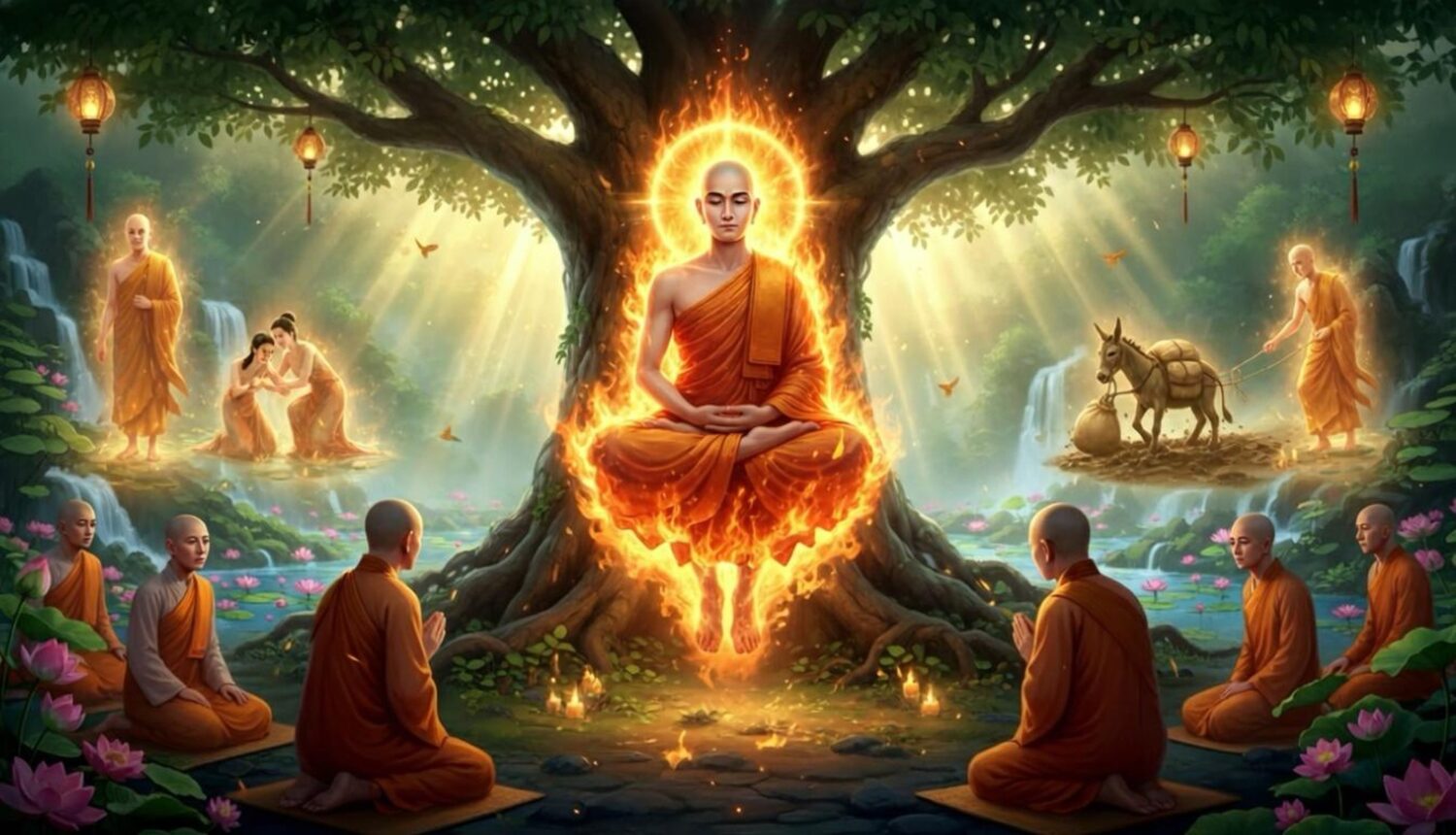
Date: 05/11/2024 05/12/2024
Location: Star Ocean Meditation Center
Teacher: Otto Huang
Dharma Talk
Suffering in Body, Not in Mind
Once, the Buddha was residing in a mountain outside the city of Shravasti, in the kingdom of Magadha, when his foot was injured and bled due to a flying piece of rock, causing significant physical pain. Despite this, the Buddha maintained mindfulness and bore the physical pain silently without any mental disturbance.
On another occasion, the Buddha traveled to the kingdom of Vaisali, located on the northern bank of the Ganges River, and stayed in a forest where wild deer roamed, at Vulture Peak.
One day, a 120-year-old lay follower named Nakula visited the Buddha at his place. After paying respects, Nakula expressed to the Buddha, “Lord, I am old and frequently suffer from the frailty and illnesses of my body, which makes movement difficult for me. It is always a challenge to come and see you and the few monks I always respect.
Therefore, each opportunity to see you is not easy for me! I hope, Lord, you can teach me the Dharma for my long-term benefit and eternal peace.”
”Good, good, lay follower,” the Buddha replied, “As you have said, as people age, their bodies naturally become prone to illness and pain. How could one expect to rely on a healthy and strong body? Only a fool would think otherwise. Therefore, lay follower, you should learn this: though my body may be ill, my mind is not ill. Lay follower, you should learn this!”
Nakula, the lay follower, was delighted by the Buddha’s teachings, thanked him, and left.
At that time, the Venerable Shariputra was sitting under a tree not far from the Buddha.
Nakula, feeling joyful, went to see Venerable Shariputra.
Seeing Nakula’s happy demeanor, Shariputra asked, “Lay follower, you look radiant and joyful today. Did you hear some profound Dharma from the Lord?”
”How could I not be radiant, Venerable Shariputra! Just now, the Lord nourished my body and mind with the nectar of the Dharma!”
”What nectar of the Dharma did the Lord use to nourish you?” asked Shariputra.
Nakula then recounted the Buddha’s teachings to Shariputra.
After listening, Shariputra asked, “Nakula, why didn’t you ask the Buddha under what conditions does the mind become ill along with the body, and under what conditions does it not?”
”Venerable, I lack the capacity for such detailed inquiry, but I wish you would explain it to me.”
”Good, lay follower! Listen carefully, and I will explain:
Under what conditions does the mind become ill along with the body?
The ignorant layperson, who has not heard the true Dharma, does not understand the arising, ceasing, attachment, misfortune, and liberation of the physical body.
Because of this lack of understanding, they develop attachment and delight in the physical body, leading to the mistaken belief that it constitutes the ‘self’ or belongs to the ‘self.’ Thus, when the physical body deteriorates, the mind is disturbed, leading to worry, sorrow, annoyance, suffering, fear, concern, attachment, and obstruction.
The same principle applies to feelings, perceptions, intentions, and consciousness. Once any of these is considered to constitute the ‘self,’ belong to the ‘self,’ be within the ‘self,’ or contain the ‘self,’ believing there is an unchanging ‘self’ as the essence of life, the result is inevitably that when the body suffers, the mind suffers as well.
Under what conditions does the mind not become ill along with the body?
The holy disciple who has heard much of the true Dharma truly understands the arising, ceasing, attachment, misfortune, and liberation of the physical body.
Because of this true understanding, they do not develop attachment or delight in the physical body, nor do they believe in a separate ‘self’ to which the body belongs. Therefore, when the physical body deteriorates, the mind is not disturbed, and there is no worry, sorrow, annoyance, suffering, fear, concern, attachment, or obstruction.
The same principle applies to the other aggregates of life: feelings, perceptions, intentions, and consciousness. Not considering any as an unchanging ‘self,’ the mind does not suffer when the body suffers.”
After listening to the detailed explanation of Venerable Shariputra, Nakula, the old lay follower, gained a profound understanding and realization.
He attained the pure Dharma eye: seeing the Dharma, attaining the Dharma, knowing the Dharma, entering the Dharma. He no longer needed to rely on others to resolve his doubts and was fearless in the true Dharma. He stood up from his seat, straightened his clothes, respectfully joined his palms together, and said to Venerable Shariputra:
“Venerable! I have now realized and attained transcendence and liberation. From this moment on, I take refuge in the Buddha, the Dharma, and the Sangha, becoming a disciple of the Buddha. Please be my witness. From now on, I devote myself to the Three Jewels for the rest of my life.”

